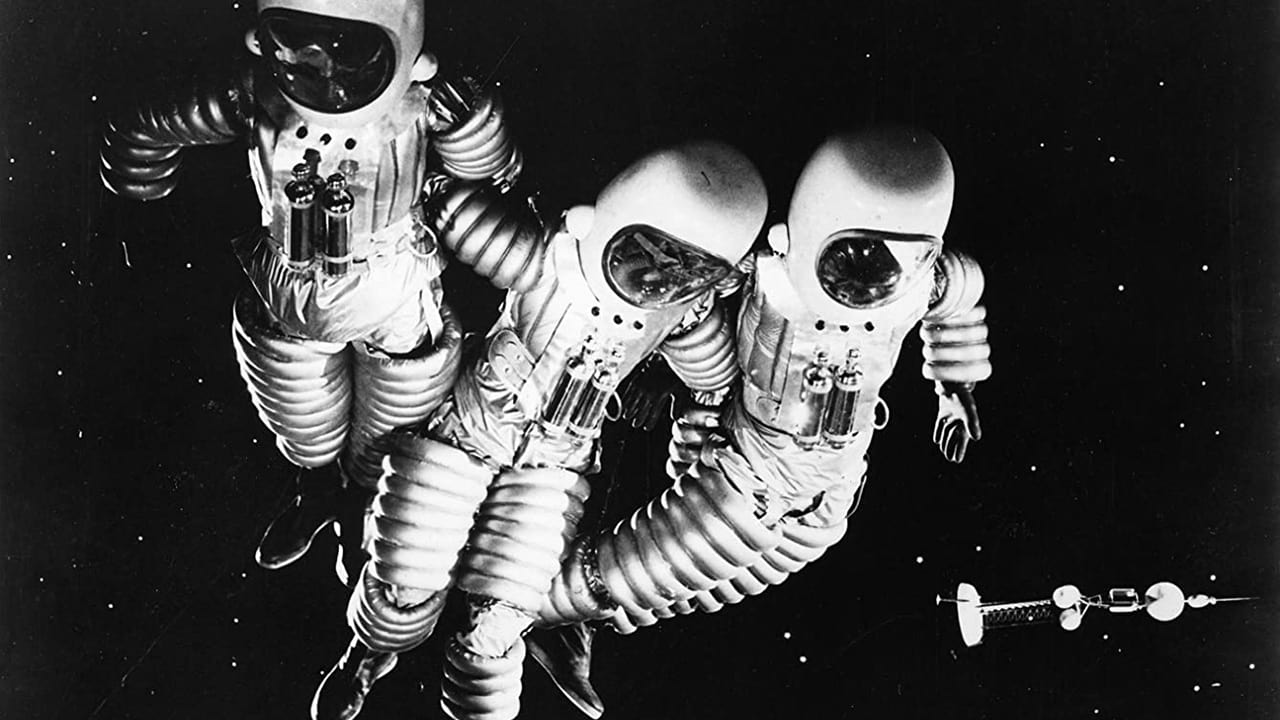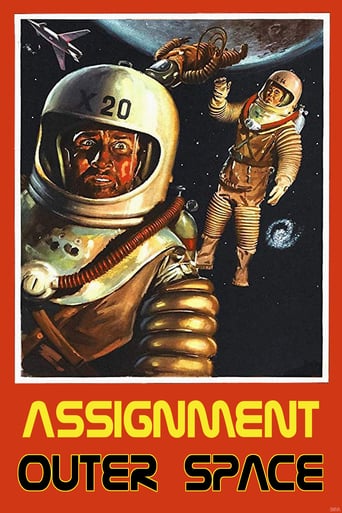Interesteg
What makes it different from others?
Teddie Blake
The movie turns out to be a little better than the average. Starting from a romantic formula often seen in the cinema, it ends in the most predictable (and somewhat bland) way.
Stephan Hammond
It is an exhilarating, distressing, funny and profound film, with one of the more memorable film scores in years,
Kien Navarro
Exactly the movie you think it is, but not the movie you want it to be.
Chase_Witherspoon
Days of Our Lives in space is the best way in which to describe this dreary, laborious non-event. Intrepid reporter (Nutter) is granted access to a space station on which the crew are less than excited about his presence to the extent he quickly earns the nickname of "Leech". Predictably, he becomes a burden in the name of any moral cause that emerges, causing conflict among the crew as they try to save the earth from oblivion.Nutter made a very brief impression in films when we played Felix Leiter in the James Bond instalment "Thunderball", but his acting leaves a lot to be desired, hampered further by the inane dialogue that leads him to compare the hot young female cosmonaut (Farion) to that of a mascot chimp that belonged to this father. Archie Savage and Franco Fantasia are the only other recognisable names in the cast playing chivalrous space heroes, while veteran spaghetti movie-maker Antonio Margheriti directs his second picture.A lot of goofy explanations and additional narrative is supplied via voice-over, while miniatures do their job at depicting outer space paraphernalia. The special effects are spectacularly infantile, but the plot thickens nicely and the tension almost makes palpable as the puerile dialogue pours on the sympathy like rivers of gravy over this proverbial turkey. But how can you not like a movie that features an actor by the name of "Alain Dijon"?
microfame
This is part of a larger 50's movie portrayal of people shot into space who are so over-emotional and unbalanced, you wonder how they beat out all the other astronaut candidates.I really just wanted to see if any other viewers shared my laugh-out-loud moment from the film......when the reporter punches out that other guy and the camera fast-pans over to the female lead in the doorway, who witnessed it, and she has absolutely NO EXPRESSION on her face! Not even a trace of any reaction....This is fine as a "background movie", on a rainy weekend day when you're puttering around the house.
sddavis63
Set on board a space ship in the year 2116, this movie has a number of problems that have to be overcome if you're going to enjoy it at all. First and foremost is the completely wooden and often lifeless acting, which the actors try to compensate for by trying (and failing) to make every scene seem as if it's the most important scene in the movie. There are also some pretty significant plot problems. First, there really is no story until about halfway through the movie. Originally, our intrepid group of explorers are heading to "Galaxy M-12," then they're heading to Mars for some mysterious reason, then they're suddenly diverted to Venus by order of "the High Command." Finally, upon the diversion to Venus, we're told that unless this ship can do something about it, the earth is going to be destroyed by some sort of rogue spaceship. I wasn't entirely clear, though, on why the earth was going to be destroyed. I was a little confused as well about why, half-way into the movie, Ray says "it's Christmas, Lucy." The line just hung there. It came out of nowhere and nothing came from it. So, both the story and the acting are a bit ridiculous. However ...There are some good points here. Gene Roddenberry is usually given credit for introducing minorities in command positions on "Star Trek," but I thought it was interesting that the engineer on this ship was black (played by Archie Savage, who had previously had minor roles in such movies as "South Pacific" and "The Ten Commandments") - and he was no token. He had important things to do, including a noble act of self-sacrifice. More thought was put into the conditions of outer space and weightlessness than a lot of low-budget sci-fi movies of that era worried about, and the on-board effects were not bad, as the crew clomped about the ship in their magnetic boots. The set was also fairly futuristic looking. Unfortunately, some of the animated space travel was rather poorly done. Once the crisis was introduced, there was a moderate amount of suspense about whether or not the earth could be saved. You know what? This isn't good, but it really isn't as bad as some people say it is. 5/10
polsixe
OK, bad FX but given it was 1960 don't be too harsh in that judgment. Not having seen all SF films from that era it's hard to say whether it was below standard or not. Star Trek didn't get so much better by 1967, substituting flashing lights for analog gauges and completely rewriting/ignoring physics. I liked some of the techno babble here - the multi-stage rocket, the sleep chamber, the arched trusses inside the space station, weightlessness, hydrazine, the paramilitary dialogue. Tossing objects out to detect the beams and stay in the middle seems reasonable and inventive for a mere reporter. "Pecking the lobe" is an electronic way to do the same thing against enemy radar in modern warfare. There was a story here but things got compromised, as usual in movies time and space (ie distances), are ignored in order to cut to the chase (see Armageddon, 1997). The guy waxing philosophical during his space walk has been done in almost every space movie since, and even Neil Armstrong, Buzz Aldrin, et al spoke that way once on earth. Anyhow, good for a laugh.

